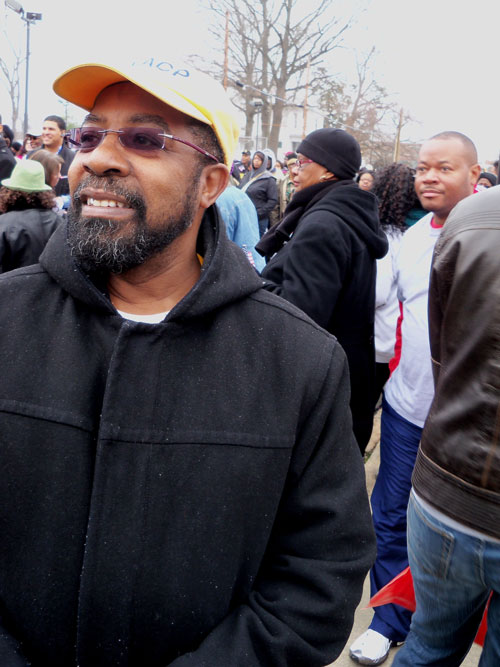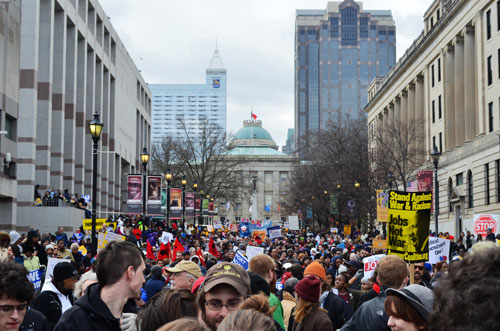By Jagir Patel
UNC Co-Editor
The Durham VOICE
thedurhamvoice@gmail.com
More than 10,000 people chanted, “forward ever, backwards never” in the streets of downtown Raleigh on Saturday, Feb. 11, for the 6th annual “HK on J,” or, “Historic Thousands on Jones Street” march.

Fred Foster, president of the Durham NAACP, mobilized groups from Durham to take part in the historic march on Jones Street. (Staff Photo by Jagir Patel)
The rally, organized by the North Carolina National Association for the Advancement of Colored People (NAACP), drew people and organizations from all across North Carolina and surrounding states in order to advocate for social justice issues that impact multiple races, ethnicities, religions, sexualities and geographies.
The mission of HK on J is centered around a 14-point agenda which touches upon issues from immigrant rights to high quality education to the environment.
“This march is about all people and all issues. There isn’t any big ‘us’ or small ‘you’ in this movement,” says Fred Foster, president of the Durham NAACP.
Foster, elected to his office in 2006, firmly advocates that relationships are the key to getting people involved and engaged in government, especially with issues that don’t necessarily impact them directly.
“I want to instill a strong relationship with folks in Durham and break it down to people; make it relevant to their own experiences,” says Foster firmly. Foster joined thousands of other activists in an almost mile march from Shaw University to the state legislative building on Jones Street.
Foster, a retired driver’s license examiner for the Durham Division of Motor Vehicles, has spent the majority of his life advocating for a range of rights, especially those for unionized workers.
“In 1955, you couldn’t even have gone into that restaurant over there if you were colored,” says Foster, pointing to the McDonald’s across from Shaw University. “Some people are trying to turn back the clock, and if we don’t get people mobilized, energized and registered to vote, the clock will indeed turn back.”
Foster’s sentiment was shared by many in the rally, including its most prominent leader, Reverend Doctor William Barber II.
Barber, president of the North Carolina NAACP, gave a speech before the beginning of the march which emphasized unity in action. “Lift up the light,” shouted Barber, as two torches symbolizing past and present social movements were lit. “We are an interracial, intergenerational movement building a whole new world.”

Thousands gathered on Jones Street in Raleigh Saturday morning to march to the state legislative building and rally for social justice and equality. (Staff Photo by Jagir Patel)
Barber’s approach to activism relies on a collective coalition of organizations and people dedicated to eradicating social injustices. According to Barber, many of the problems society faces today arise from a lack of engagement and accountability of our state politicians.
The comments made by Barber resonated with many during the march, especially Foster.
“Reverend Barber is the reason people are here. He has motivated people to engage in their communities, and my job is to do the same in Durham,” says Foster. “We have to make people understand that they are the most important part of the election process.”
Foster does his part by encouraging members of the Durham NAACP to attend city council meetings and to speak to their state representatives.
“The Constitution says ‘we’ the people, not ‘me’ the person. I then make sure that I ask people at the end of each Durham NAACP meeting, ‘Is there anyone in the room whose issues I haven’t addressed?’” Foster says.
The Durham NAACP takes a grassroots approach to its organizing by having meetings at a different church each month. Foster believes that the relationships he has made in these meetings have enabled his organization to be a part of the HK on J march.
“Relationships are why this march is important,” Foster says. “I want the best for my children, and it is now time to demand the best.”